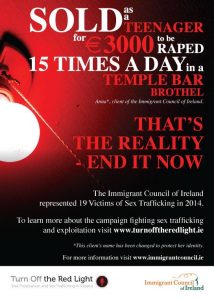
By Ann Marie Foley - 09 August, 2016

TD John Halligan
Comments by TD John Halligan have re-ignited the campaign to pass and enact the Sexual Offences Bill which will criminalise the purchase of sex in Ireland.
Ruhama and the Immigrant Council of Ireland have backed the Turn Off the Red Light Campaign and called for support for the bill following comments from TD and Minister of State for Training, Skills and Innovation John Halligan in a Hot Press interview with Jason O’Toole.
The Minister stated that prostitution should be legalised and regulated.
Not to do so would be “cruel” he said and he questioned why it should be a criminal offence for “two consenting adults” to have sex.
The Immigrant Council of Ireland stated that most women in prostitution want to exit and that all too many are coerced and trafficked.
“We have supported more than 60 victims of trafficking for sexual exploitation. All have been women, each with her own unique experience, but all have suffered immensely. We must act to change this.”
“The Government can enact the Sexual Offences Bill within a matter of weeks once they return from their summer recess. This Bill takes huge strides in tackling many forms of sexual exploitation of vulnerable children and adults,” the Council stated.
The Bill had received cross-party support before the election was called and a new Government formed.
On Newstalk radio last week, Independent TD John Halligan called for a new debate about the issue of prostitution the Dáil. He stated that regulating prostitution would help women who choose to work in the sex trade.

Sarah Benson, CEO, Ruhama
Sarah Benson, CEO, Ruhama, responded that regulation of the sex trade has failed for example in Germany regulation has given more to the person organising prostitution, and turned them from a “pimp” to “business person.”
“The sex trade is inextricably linked, always, to exploitation, organised crime – and it requires numbers of women and girls usually to fuel demand for the purchase of sex which simply can’t be met – ever – by those who would say they freely choose it,” she told Newstalk Breakfast.
“So therefore it is always going to target vulnerability.”
She said that John Halligan’s comments were about the right to buy sex as opposed to protecting the person in prostitution.
Last year, Ruhama’s team worked with over 301 women affected by sex trafficking and prostitution from 43 countries, through practical and supportive services.
The group issued what it called a “rejoinder” to the Minister.
This male-led campaign to end men’s violence against women stated it was shocked that Minister Halligan, who prides himself on supporting the oppressed, could be “so dangerously wrong” on the issue.
“For him and for the rest of us, we can continue to believe that our exhortation of meaningless slogans are helpful or we can engage with the material injustices that sustain the systems of power and oppression that underpin the sex-trade. We don’t need male platitudes or even guilt. We need to stop validating male demand for commodified sex. We need to stop buying sex,” the male group stated.

Turn Off the Red Light campaign aims to end prostitution and sex trafficking in Ireland. It is an alliance of civil society organisations which feel that trafficking women and girls for the purposes of sexual exploitation is a modern, global form of slavery.
Its supporters believe that the best way to combat this is to tackle the demand for prostitution by criminalising the purchase of sex.
An Immigrant Council of Ireland report, covering a 21-month period from 2007 to 2008 and titled “Globalisation, Sex Trafficking and Prostitution – The Experiences of Migrant Women in Ireland”, uncovers the reality of rape, abuse and sexual exploitation of victims of sex trafficking, the campaign stated.
It documents the physical, emotional and psychological harm these women and girls suffered.
Over the 21-month period it found 102 women and girls were victims of trafficking presented at services and of these, 11 were children at the time they were trafficked.
The campaign stated that these are a fraction of the real number of victims of trafficking in this country – the ones who were rescued or escaped from their traffickers and pimps.
The research highlights that there is no clear line between those who are trafficked and those who “consent” to become involved in the sex industry.
The campaign states that latter have had no real choice: poverty, deception and gross exploitation mark many of their stories. The prostitution industry is worth an estimated €180 million a year in Ireland.